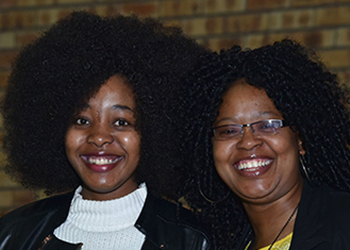
Boniswa Segoe with Tshegofatso Setilo at the FASSET
prize-giving. Boniswa received two separate accolades
on the day for her academic achievements.
Photo: Charl Devenish
On 12 August 2016, 125 FASSET-funded students on South Campus were rewarded for their first-semester efforts during a ceremony “to celebrate hard work, dedication, and excellence”, according to Lerato Sekonyela, who chaired the event. FASSET is the Finance and Accounting Services Sector Education and Training Authority. This sector is the largest employer of people with financial skills. “One of FASSET’s many objectives is to develop the competence of employees, resulting not only in an incredible level of training , but also in an improvement in the quality of life for many,” according to Tshegofatso Setilo, Manager: University Preparation Programme at the South Campus.
Jean Grundling, Academic Head at South Campus, welcomed students, as well as the guests, tutors, and facilitators present, saying, “This is a milestone in your learning journey.” Quoting the words of Nelson Mandela, “A good head and good heart are always a formidable combination”, Grundling added, “Never stop learning, but also look at the compassion in your hearts.”
Tania Lee, projects director at FASSET, explained how funding is obtained from the financial sector. Ms Lee also expanded on the various projects FASSET is undertaking; from the lowest level, where schoolchildren are provided adequate career guidance, through TVET support by means of learnerships, to a full bursary scheme planned for next year.
Ms Lee advised: “Position yourself for success.” Using an analogy from an athletics event at the recent Rio Olympic Games, she exhorted students to take up a position like a runner in a relay race, poised and ready to sprint off after receiving the baton. She urged: “Aspire to become the heroes for our country.”